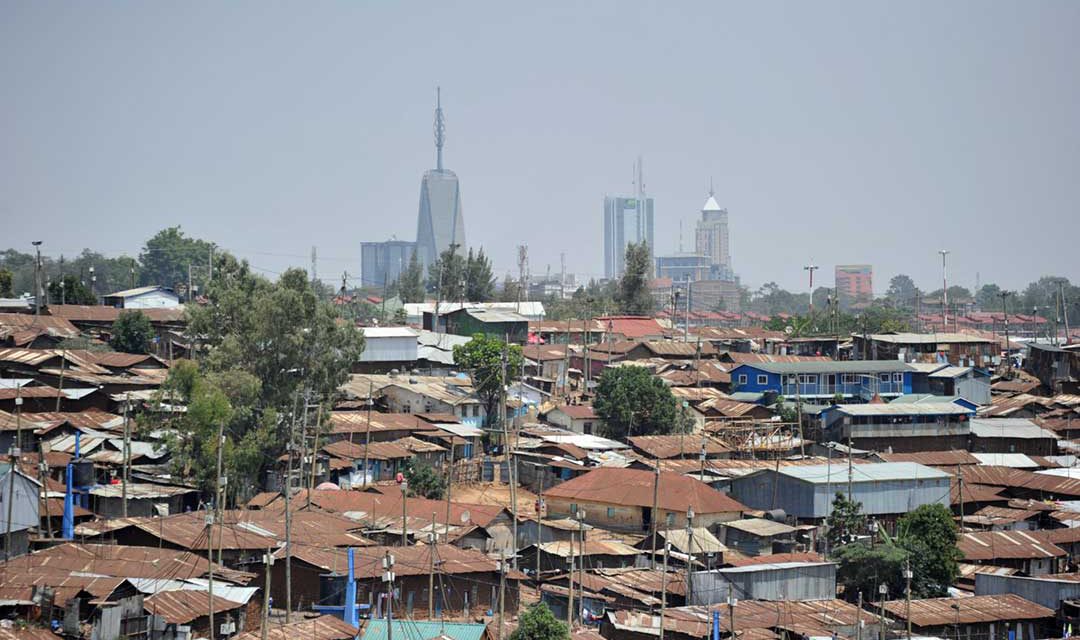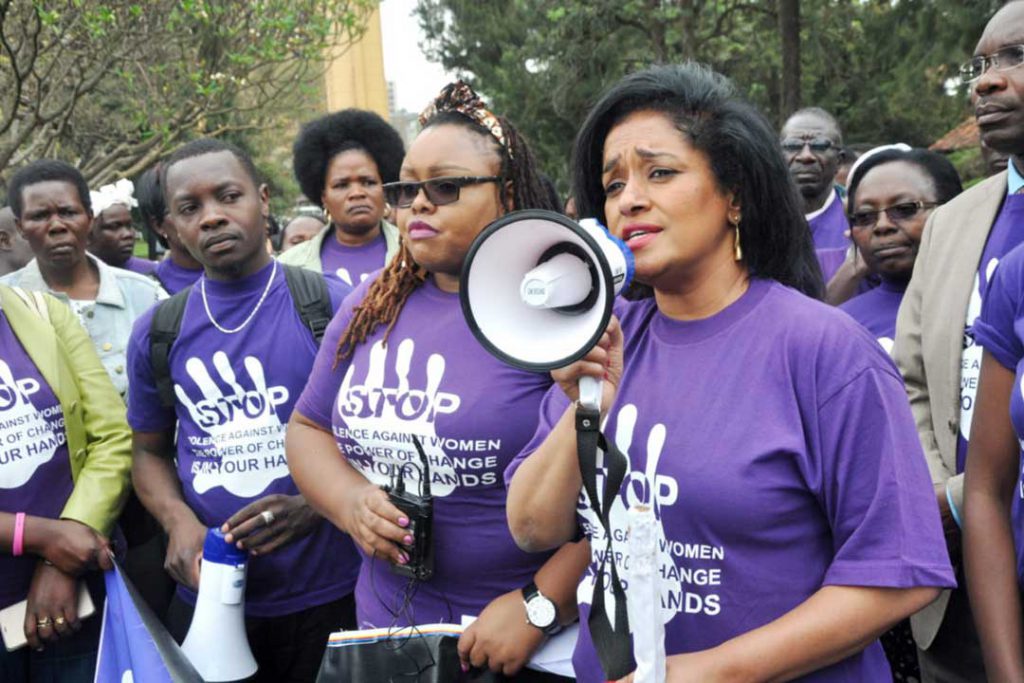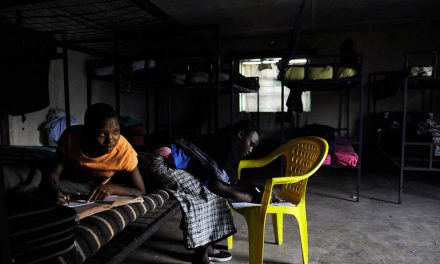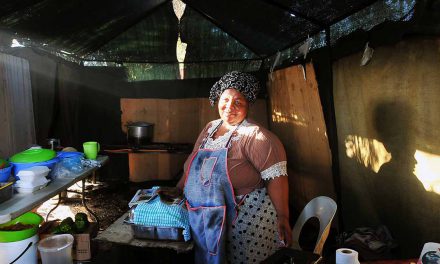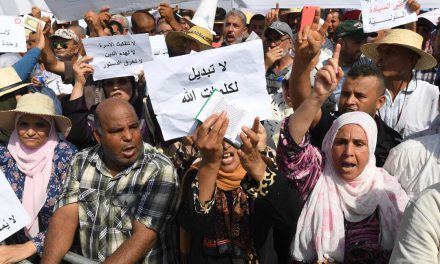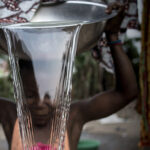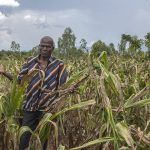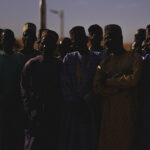Female activists and politicians in Kenya say misogyny and violence against women are an all-too familiar aspect of political campaign periods
“They threw raw eggs at me as they abused me, saying I am a woman and therefore not fit to be their leader. At a shopping centre, where I was holding my final campaigns before the voting in the 2017 elections, an elderly man stood up and angrily shouted at me: ‘So you want to be a member of parliament? Who will take care of your family? Your place is to bear children and cook for the family.’ Then he sat down amid cheering from the crowd.”
Janepher Wanyonyi, who ran for a parliamentary seat in western Kenya in 2017, is describing just one of the interactions she faced every day during her eight-month campaign; none of them attracted the condemnation of the authorities. In Wanyonyi’s view, the old man’s statement is typical of a view of women that is common in Kenyan society. Women should be seen and not heard, she says; they are not expected to lead. Their place is on the periphery – mainly in the kitchen and on the farm.
“Women are not only discriminated against, they are beaten by their husbands, while some are denied education,” says Wanyonyi, who has since started the process of registering a non-governmental organisation, Sauti Ya Mama (The Voice of Women) to help tackle violence against women.
The organisation aims to champion the rights of Kenyan women, particularly in remote areas where violence against them is prevalent. The plan is to train women to know their rights, and the organisation will also act as an SOS centre that offers women help, including counselling in cases of sexual violence, while also seeking to empower them economically. Sauti Ya Mama plans to have regional offices in all 47 of Kenya’s counties, making it easy for women to access its services.
Entrepreneur and politician Esther Passaris, who won the women’s representative seat for Nairobi county in 2017, says political campaign periods appear to offer men the opportunity to display overt misogyny. The 2013 general election in Kenya, in which she unsuccessfully contested for the same seat, provided her with first-hand knowledge of this. She was faced with physical attacks and attempts at sexual assault, as well as attacks against her on social media, which, Passaris says, women in politics constantly have to endure.
“There were thousands of fake Twitter and Facebook accounts assigned to attack me,” she told Africa in Fact. “The accounts would carry feminine names so as to give the public the impression that it was a women-women affair. Despite the attacks, I did not give up. Neither did I respond to their abuse. You fight your enemy with love. That is how I won the seat last year.”
A December 2017 Human Rights Watch (HRW) report observed that widespread sexual violence against women and girls was a feature of the 2017 elections and the post-election violence that followed. According to the report, the violence involved rape (including vaginal and anal rape), gang rape involving two or more perpetrators, mass rape, attempted rape, rape with an object, putting dirt into a woman’s private parts, unwanted sexual touching, forced nudity and beatings on genitals.
Many of the affected women, HRW said, reported that their rapists were policemen or members of Kenya’s security forces and militia groups. About half of the assaults, HRW said, involved gang rapes, with the majority of the victims contracting sexually transmitted diseases as well. “Many women and girls said they suffered incapacitating physical injury or experienced other health consequences that left some unable to work or care for their families,” according to the HRW report. “Most had not received post-rape medical or psychological care, including medication to prevent HIV and other sexually transmitted infections and unwanted pregnancy.”
According to the World Health Organization (WHO), about 35% of women globally have experienced either physical and/or sexual intimate partner violence. Violence against women is a major public health problem and a violation of women’s human rights, it argues. In Kenya, meanwhile, cases of physical violence such as wife battering have declined, but intimate partner violence and sexual violence are on the rise.
The causes of violence against women are many and complex, according to WHO. But its research shows that men are more likely to perpetrate violence if they have low literacy levels, a history of maltreatment and neglect as children, were exposed to domestic violence against their mothers, are subject to alcoholism and exposed to gender norms that tolerate violence and a sense of entitlement over women.
“Dress nicely and just walk around the streets of Nairobi or any other major town – men will give you funny looks,” says Dr Joyce Laboso, the governor of Bomet county. “They will attack your modesty. Sometimes they will ask, not politely, for sex. To them, there should never be a ‘no’ from a woman.” Whereas domestic violence against women mainly involved physical beatings, more recently it had increasingly involved intimate and sexual violence, she says.
This is something that Suzie Kimeu, a mother of five in Nanyuki, central Kenya, experienced for herself in 2013. “(That day), I had just come from a farm, where I worked as a casual labourer, when my husband asked for food,” Kimeu told Africa in Fact. “I said I had not prepared anything because there had been no food at home. He slapped and kicked me while my children wailed, and then he ordered me to go the kitchen and prepare the food that I had brought from the farm.”
Later that evening, Kimeu says, her husband, who was drunk by then, asked for sex. “I told him I was tired, having been in the fields for more than eight hours, but he did not listen. He forced me to have sex. I remember bleeding a lot. He threatened to chase me from our matrimonial home and said that he would marry another woman if I did not sleep with him.” After a series of similar attacks, Kimeu says she divorced her husband three years ago and is now “happily single”.
Women governors, MPs and senators are now partnering with non-governmental organisations to deal with the increase in cases of intimate partner sexual violence, says Laboso. “From past experience, we know that sexual assault in a relationship does not occur in a vacuum,” she says. “It often occurs alongside other abusive behaviours. For instance, the majority of women who are physically assaulted by an intimate partner have also been sexually assaulted by that partner.”
One of the non-governmental organisations addressing sexual assault and other abuses against women in Kenya is the Coalition on Violence Against Women (COVAW), which was founded in 1995 to respond to “the silence of Kenyan society” regarding violence against women and girls. COVAW chair Carolyne Odula-Obonyo says the organisation supports research on gender-progressive policies and legal and institutional frameworks, as well as their implementation, besides providing input on critical social themes relating to gender.
“We generate and share new knowledge relating to the development and well-being of girls and women, as well as solutions to the problems they face,” says Odula-Obonyo, a gynaecologist and obstetrician by profession, who works at the University of Nairobi’s College of Health Sciences. She notes that the biggest challenge in the fight against men’s violence are deeply ingrained cultural practices, which forbid women from revealing what they go through (such as being beaten by their husbands) in public.
Kenya’s global scores on gender-related violence paint a gloomy picture. Some 43% of married women have experienced sexual violence, while 32% of young women aged between 18 and 24 have experienced sexual violence and an estimated 23% of girls are married before their 18th birthday. Violence against women and girls, UN Women says, can be arrested by expanding women’s access to services that deal with their sexual and reproductive health needs – including post-rape care and counselling if needed – and facilitating their access to the justice system and safe-house networks.
The UN Women’s Safe Cities Initiative is an example of how this can be achieved. The project, which the global body conducts in partnership with other UN agencies, local and national governments and community groups, works to create safe public spaces for women and girls. It has been established in 21 cities across the globe so far, including Cairo, Cape Town, Kigali, Maputo, Marrakech and Rabat, and that number is growing. These include environments that are sexual harassment-free and safe public spaces.
But Odula-Obonyo says there is still much more to be done. As the late UN Secretary-General Kofi Annan observed in a speech to the Inter-Agency Video conference for a World Free of Violence against Women in New York on 8 March, 1999: “Violence against women … knows no boundaries of geography, culture, or wealth. As long as it continues, we cannot claim to be making real progress towards equality, development and peace.”
CHARITY CHELIMO is a current affairs analyst based in Nakuru, Kenya. She holds a masters degree in finance for the University of Nairobi and has more than six years’ writing experience.

